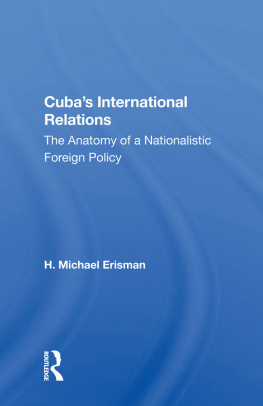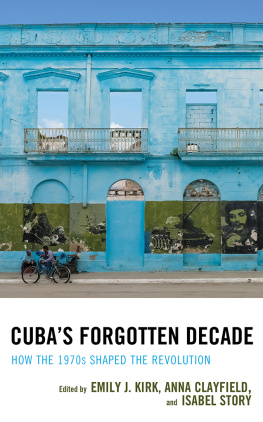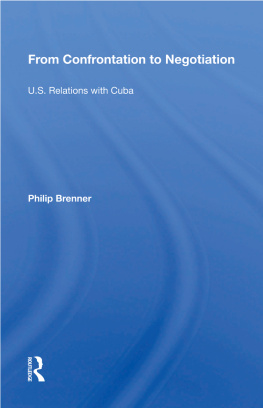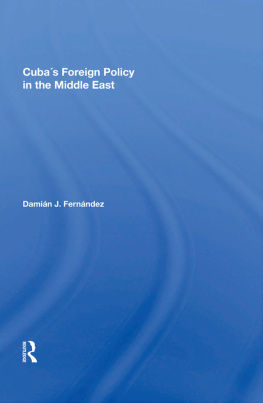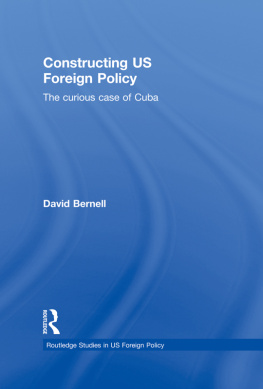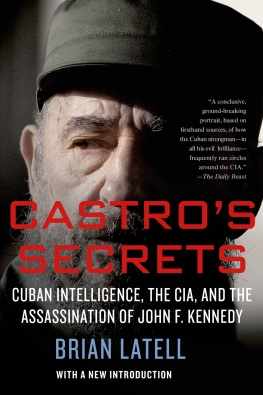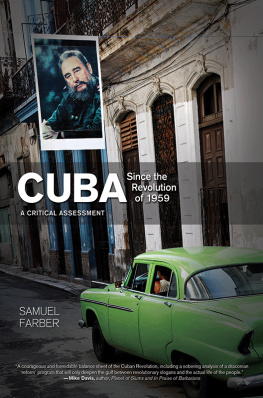First published 1985 by Westview Press, Inc.
Published 2018 by Routledge
52 Vanderbilt Avenue, New York, NY 10017
2 Park Square, Milton Park, Abingdon, Oxon OX14 4RN
Routledge is an imprint of the Taylor & Francis Group, an informa business
Copyright 1985 Taylor & Francis
All rights reserved. No part of this book may be reprinted or reproduced or utilised in any form or by any electronic, mechanical, or other means, now known or hereafter invented, including photocopying and recording, or in any information storage or retrieval system, without permission in writing from the publishers.
Notice:
Product or corporate names may be trademarks or registered trademarks, and are used only for identification and explanation without intent to infringe.
Library of Congress Cataloging in Publication Data
Erisman, H. Michael.
Cuba's international relations.
(Westview special studies on Latin America and the Caribbean)
Includes index.
1. CubaForeign relations1959- . I. Title. II. Series.
F1788.E68 1985 327.7291 84-29106
ISBN 13: 978-0-367-00524-5 (hbk)
A special aura has always surrounded the Cuban Revolution; almost from the moment that Fidel Castro mounted his attack on the Moncada Barracks in July 1953, and definitely after he and his guerrillas marched triumphantly into Havana in January 1959, Cuba has received international attention far out of proportion to the island's modest size and meager natural resources. This notoriety can to some extent be attributed to Castro himself, who is undoubtedly one of the most intriguing figures of the twentieth century. Few leaders have matched his rare combination of political acumen, charisma, flamboyance, and audacity. As such, both Castro and his revolution have assumed a larger-than-life stature. Even today, after more than a quarter of a century in power, the mystique that surrounded the Fidelistas as they stormed out of their mountain strongholds to unleash their final offensive against Fulgencio Batista's tyranny remains as vigorous as ever, if not in some respects stronger.
A major factor contributing to this phenomenon has been the Fidelistas' ability to exert a significant impact on the global stage. Indeed, the Revolution very quickly became an international event. Havana first made its presence felt by boldly defying the United States, with such headline-grabbing results as the April 1961 Bay of Pigs invasion and the October 1962 Missile Crisis, and by actively promoting its freewheeling brand of guerrilla politics, which led during the 1960s to the formation of Fidelista-inspired movements throughout Latin America and, on a lighter note, to the popularity of beards among young leftists everywhere. Beginning in the 1970s, the growth of Cuba's international stature was accelerated by Cuba's effectiveness, unprecedented for such a small nation, in extending both military and developmental assistance to other Third World states.
Over the years, Castro and his colleagues have been extremely successful in making their country a force to be reckoned with on the world scene. Especially since 1975, when Cuba became deeply involved in the Angolan war, the island's foreign policy has assumed international implications as Havana has sought to influence the dynamics of the international system in a variety of geographical and issue area contexts. This capacity to wield wide-ranging leverage abroad on a regular basisunique among comparable underdeveloped nationsmay be called Cuban globalism. This globalism has given revolutionary Cuba its singular status in the family of modern states and continues (as I write this in late 1984) to fascinate, to inspire, to perplex, and in some quarters to infuriate those confronted by it.
Strangely enough, despite the subject's obvious importance, there have been relatively few macrosurveys of Castro's foreign policy. Instead, most studies have opted for a narrower focus, usually concentrating on Havana's dealings with either the United States, the Soviet Union, or its neighbors in the Western Hemisphere. This book adopts a much broader perspective. Its goal is to trace and analyze the overall evolution of the Cuban Revolution's foreign policy, with special emphasis on the globalist phase from 1975 onward. To simplify and facilitate this endeavor, Havana's policy is broken down into six major periods and four crucial substantive topics (Cuban-U.S. relations; Cuban-Soviet relations; Cuba's Third World policies, particularly in Africa and in the Nonaligned Movement; and Cuba's Latin American activities, especially in the Caribbean Basin). All four issue areas are examined in each chronological stage in order to ascertain the main considerations that have shaped Cuba's international behavior. In the process, a concerted attempt is made to stress what too often has been a sorely neglected aspect of Havana's foreign policyits nationalistic dimension. North Americans have been prone to become obsessed with Castro's Marxist-Leninist beliefs and therefore to overlook the nationalism that has always been a core ingredient in the island's politics. Castro was a Cuban nationalist long before he became a communist, and this nationalist tradition is deeply embedded in the Revolution's ethos. By highlighting the nationalist factor, this volume seeks to present a somewhat novel and probably controversial interpretation of Castro's foreign policy that suggests a much greater potential for U.S.-Cuban dtente than is commonly assumed.
Supplementing the book's regular text are pertinent selections from Castro's speeches and press interviews, providing the reader with a direct presentation of Havana's viewpoint on international questions. These policy statements have been edited to remove material that is not relevant to the issue at hand. In practically every instance official Cuban translations into English are used to assure that Castro's statements are given in his own words. The only exception is the speech in Appendix 4.10, which was not made public by the Cubans. The translation of this speech comes from U.S. government sources.
Like all books, this one would never have seen the light of day had it not been for the efforts of many dedicated people. If publishing was primarily an exercise in elementary justice, their names would all appear on the cover. But unfortunately, tradition as well as lack of cover space dictates that their contributions be briefly acknowledged at this point. Therefore, with considerable embarrassment that the recognition is by no means commensurate to the importance of their help, special thanks go to Lynne Rienner and to the people at Westview Press, particularly Deborah Lynes, all of whom invariably have been more than accommodating to my proposals; to the Faculty Policies Committee of Mercyhurst College for its financial support; to Lisa Huffman and Terri Fiscus, two indispensable student assistants who cheerfully did most of the word processing, correspondence, indexing, and whatever other wretched tasks I wanted to avoid; and above all to Marge and Tammy Erisman for graciously allowing me back into the house even though I often deserted them for my office and sometimes interrupted their sleep with pickup calls from airports at very odd hours.
H. Michael Erisman
Mercyhurst College

